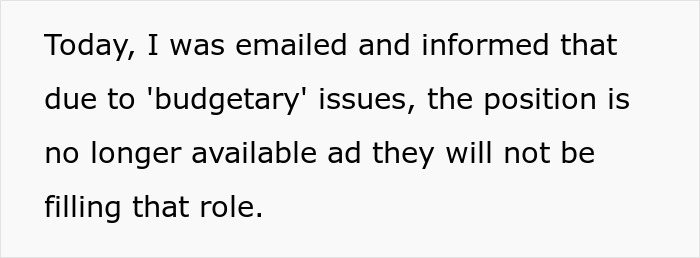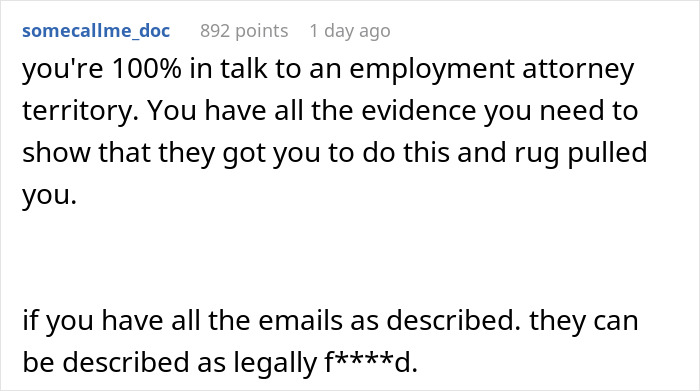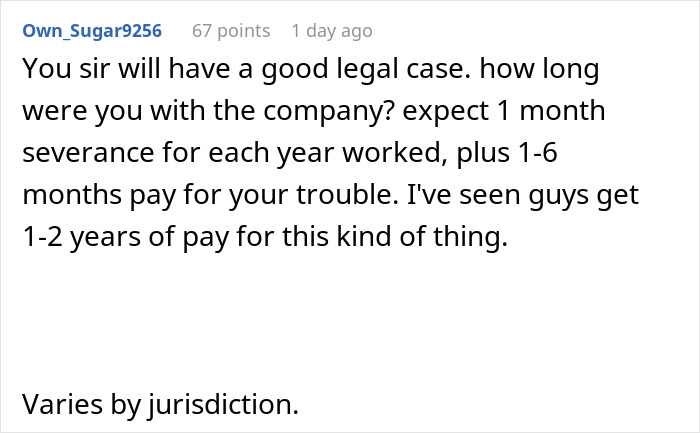Moving across the country for a job is not something unheard of. It does, however, change your life in a pretty significant way. In many cases, the employee leaves his home, social circle, and material belongings behind. So it’s comforting to know you won’t have to worry about at least one thing – your job.
Sadly, this is not what happened to the author of this story. This Redditor went on to r/AntiWork to share his story of how his company possibly tricked him with constructive dismissal. His work demanded he move 1,700 miles, but then, after he already made the plans, informed him that the position was no longer available. To make sense of this, the Redditor asked other netizens what to do.
Moving for work means uprooting your whole life: renting out your current home, booking temporary housing, and selling personal items and furniture

Image credits: Michal Balog / unsplash (not the actual photo)
So when this man made a full commitment, the shocking news from his employer was less than pleasant



Image credits: Headway / unsplash (not the actual photo)




Image credits: Ketut Subiyanto / pexels (not the actual photo)


Image credits: notmydayJR
People were quick to ask the OP whether he had the work correspondence in writing

The principle of promissory estoppel might help in the OP’s defense

Image credits: August de Richelieu / pexels (not the actual photo)
The situation the OP finds himself in is definitely unpleasant and probably even illegal. Many commenters were quick to point out that the OP should seek legal counsel as soon as he can. The two most popular pieces of advice were for the OP to look up the terms ‘promissory estoppel’ and ‘constructive dismissal.’
First, let’s tackle the former. What exactly is an estoppel? Although it sounds quite confusing, ‘estoppel’ is a law principle that “prevents one person from contradicting an action or statement from the past.” Common law systems in the U.S., Canada, the UK, and other countries have it. There can be collateral estoppels, equitable estoppels, and promissory estoppels.
Promissory estoppels can protect people who act on another person’s reasonable promise. If the other party breaks that promise and the person suffers financial losses, they might get compensated. A court might rule to assign the person either reliance damages or expectation damages. Canadian lawyer Brian Babcock also describes promissory estoppel as “the legal system’s version of ‘no backsies.'”
Are there any conditions for the situation to qualify for this defense? Babcock lists three. The first is that the other party must have made a promise or an assurance. The promise also has to affect the legal relationship between the person and the other party. And, lastly, the person has to have acted on that promise in some way or changed their position.
Babcock also warns that not all statements can be promises. In the case of the Trial Lawyers Association of British Columbia v. Royal & Sun Alliance Insurance Company of Canada, the court ruled in favor of the insurance company. The argument was that they did not know all the facts, and their statements did not constitute a promise.
He further explains why relying on this sort of defense might be risky. “If you decide to rely on someone else’s promise, it is likely that you do not know exactly what they actually know, but [you] can make a pretty good guess what they probably or should know since they are acting like they know. The result is that the burden on you in deciding to rely on a promise becomes impossibly high.”
The OP’s situation might also qualify as constructive dismissal
There was also a lot of speculation in the comments about whether the employer did this on purpose. “This was supposed to be a creative dismissal, you called their bluff,” one user wrote. Others started saying that this was a case of constructive dismissal. “I mean, to be fair, it IS pretty creative,” another Redditor pointed out.
For those unfamiliar with labor laws, a constructive dismissal might occur when an employer negatively changes the terms of employment. An employee and an employer sign an employment agreement, which determines the salary, location, and other terms. After that, neither the employer nor the employee has the right to change them without mutual agreement.
If a company does that, the employee has the right to “treat their employment as being terminated.” Employment lawyer Lior Samfiru explains: “A constructive dismissal really is a situation where your employment is terminated even though the company did not flat out let you go.” Employees who experience this might resign and seek full severance pay by filling out a wrongful dismissal claim.
However, it’s not entirely clear what the OP’s current situation is. It seems that he technically has no job at the moment. “My current job is in limbo with my previous position ‘removed as well,'” the OP wrote in his post. But only legal experts can say whether that qualifies as a constructive dismissal.
Support and advice for the OP poured in from the commenters


















